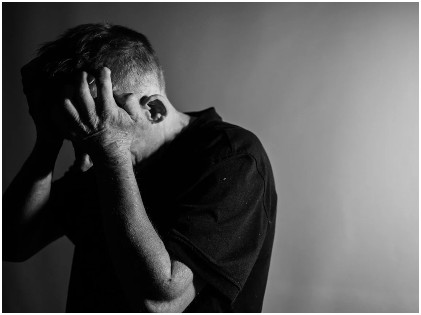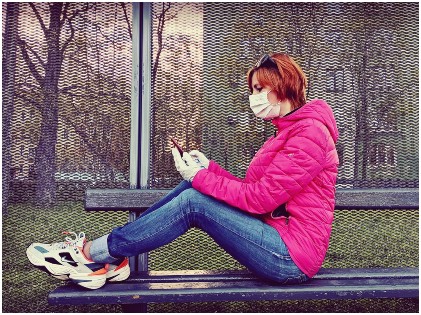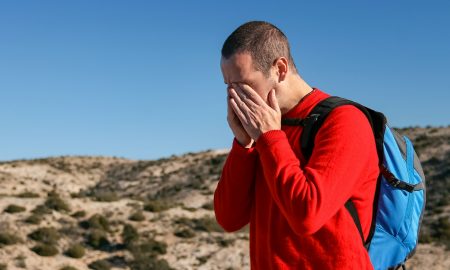
Here’s How Isolation Can Affect Your Mental Health

 Physical distancing has undoubtedly worked wonders for the most part in controlling the pandemic spread. And this has led to far more mental and emotional issues than ever before. In a bid to prevent the spread of SARS-CoV-2, mainly responsible for COVID-19, deeper problems like depression, isolation, and loneliness have become part and parcel of life.
Physical distancing has undoubtedly worked wonders for the most part in controlling the pandemic spread. And this has led to far more mental and emotional issues than ever before. In a bid to prevent the spread of SARS-CoV-2, mainly responsible for COVID-19, deeper problems like depression, isolation, and loneliness have become part and parcel of life.
In some conditions, the usual symptoms of depression and anxiety have even manifested themselves into larger ones. Yes, the ones like dementia, Alzheimer’s, and Parkinson’s, too, to name a few. Socializing at a distance, via phone calls, or using online platforms is a must to ward off such ailments, as suggested by the World Health Organization (WHO). It’ll surely pay off knowing the little titbits about aspects that concern our lives to a considerable degree at present for those who are new to this.
The Link Between Mental Health And Isolation
WHO has laid down that social support networks go a long way in determining our health’s positive impact. Had it not been for this virus, we would have never taken these issues seriously! Even several countries have now kept loneliness as one of the chief health priorities. Man is a social being and maintaining social connections is vital to one’s physical and mental health.
Survival strategies and complete well-being mean one must foster positive relationships, as per researchers. Unfortunately, issues like loneliness and isolation may assume larger proportions in manic depressive disorders, schizophrenia, dementia, and more. Certain physical conditions like cancers and heart diseases can also lead to developing loneliness.
Risks Are Bigger For Senior People

Health organizations worldwide have demonstrated exactly how beneficial it is to resort to physical distancing without understanding the mental issues. Particularly for older adults, this has been a difficult time to deal with isolation. Before the COVID-19 pandemic, researchers came to a basic estimate that isolation affected a significant population of close to 8 million elderly! Older adults experience life changes more frequently than their younger counterparts.
Naturally, chances of loneliness for them increase manifold. For example, children leaving the nest, widowhood, retirement, and age-related health issues often lead to breaking social ties. As a result, socializing takes a backseat. In addition to that, aging is inevitable. So are underlying health conditions or risk factors that cause this age bracket to become particularly susceptible to COVID-19 symptoms.
Now that wide disparity exists in terms of how senior citizens dealt with aging earlier and now. Societal trends also lead to disconnection. Think of the average household size or couples deciding not to conceive, and you will know how aloofness is in demand! Added to that are lifestyle factors like living alone, being single, getting divorced, not marrying, and so on.
Possible Signs And Symptoms Of Isolation-Induced Conditions
A person’s mental health is dependent on several factors. This includes anxiety level, aggressive behavior, decreased sleep, cognitive impairment, memory loss, self-neglect, etc. Every person is different, even when they’re in the same age bracket! So loneliness or isolation and their consequences can occur at different times in different people.
Establishing Support
 As they say, ‘when there’s a will, there’s away. There are multiple routes to connect with people of the same age group or across varied sectors to reduce the ill effects of loneliness. It’s all about improving one’s mental health. Make it a point to reach out as much as possible to your near and dear ones like friends, lovers, and relatives.
As they say, ‘when there’s a will, there’s away. There are multiple routes to connect with people of the same age group or across varied sectors to reduce the ill effects of loneliness. It’s all about improving one’s mental health. Make it a point to reach out as much as possible to your near and dear ones like friends, lovers, and relatives.
Now that multiple platforms exist in the form of phone and text, video chat platforms, mail, and social media- it has become fairly easy to derive happiness being in the company of your close set of people. Of course, not really, but virtually!
Anyone who’s experiencing the debilitating effects of loneliness or siltation should immediately seek help from a therapist or doctor. After all, consistently worrying or stressing, not focusing, feeling restless or irritable and recurrence of suicidal thoughts are not right. If you find anyone not taking proper care of themselves, it is time to offer help. Remember, there is no shame in asking for help and taking care of your mental health. Because at the end of the day, your mental well-being is as important as your physical well-being.
More in Relaxation
-
`
Jennifer Aniston’s Timeless Tips for Health and Youthfulness
Iconic Hollywood actress Jennifer Aniston has long been admired for her acting prowess and seemingly ageless beauty and vitality. Now in...
November 22, 2023 -
`
Unleash Your Entrepreneurial Drive: 5 Strategies for Self-Motivation
5. Have an Undying Passion Passion is the driving force behind the world’s most successful entrepreneurs. Self-motivation becomes second nature when...
November 19, 2023 -
`
How to Go Vegan – The Right Way!
The vegan lifestyle has seen a significant surge in popularity lately, and rightly so. Embracing veganism not only fosters personal health...
November 12, 2023 -
`
7 Eye-Opening Reasons to Drink More Water
Water is frequently hailed as the quintessential elixir for life, and rightfully so. Constituting approximately 60% of our total body weight,...
November 1, 2023 -
`
Drake’s Workout Regimen: How the Canadian Rapper Stays Fit
The lights dim, the stage is set, and the crowd’s anticipation is palpable. When the beat drops, there is one Canadian...
October 24, 2023 -
`
Why Six-Figure Family Holidays Are Becoming the New Normal
In the panoramic landscape of the modern travel scene, a particularly glittering trend is emerging, akin to finding a diamond the...
October 21, 2023 -
`
Foods With High Water Content
Water is the elixir of life, and staying adequately hydrated is crucial for maintaining our health and well-being. While sipping on...
October 15, 2023 -
`
The Impact of Wearable Technologies in Health Research
In recent years, wearable technologies have emerged as a powerful tool in health research, revolutionizing how we collect and analyze data...
October 3, 2023 -
`
How Celebrities Stay Fit? Secrets of Chris Pratt, Jennifer Lopez & More
The glitz and glamor of Hollywood may make it seem impossible for celebrities to maintain an enviable physique. But it is...
September 29, 2023















You must be logged in to post a comment Login